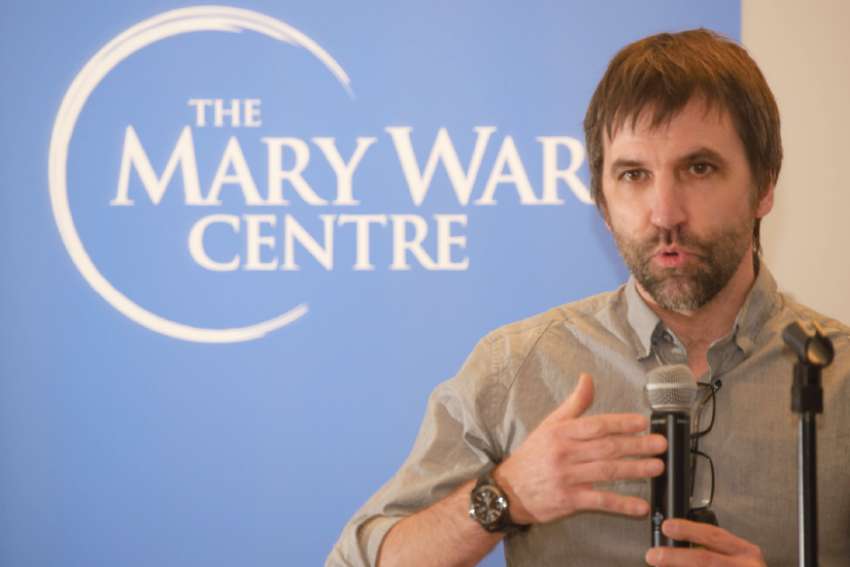Steven Guilbeault, senior director of Equiterre, said religious voices are needed at environmental talks in Bonn, Germany.
Photo by Michael Swan
Catholics make case against fossil fuels
By Michael Swan, The Catholic Register
The Catholics at the United Nations climate negotiations in Bonn, Germany, are demanding oil and coal be left in the ground starting now.
“Fossil fuels enabled huge human advances but they must now be left in the ground or else they threaten to make our planet uninhabitable,” reads a statement 18 Catholic development organizations were releasing at the climate talks Nov. 15. “Each litre of petrol that feeds a needlessly large personal vehicle, each tonne of coal burned to power luxuriously large homes, each hectare of land cleared to provide for meat-intensive diets must be seen as a trade-off for the welfare of the poor today and in the future.”
The Catholic Register obtained an advance copy of the statement entitled “Climate Action For The Common Good.” The manifesto from CIDSE (Coopération Internationale pour le Développement et la Solidarité) urges official negotiating teams at the climate talks to remember Pope Francis’ 2015 encyclical Laudato Si’, which played a major role in the Paris climate agreement reached in December of that year.
The Bonn talks, running Nov. 6-17, are aimed at coming up with a rule book for national governments as they draw up plans to limit carbon emissions to reach the Paris agreement goal of capping global warming somewhere between 1.5 and 2.0 degrees (C) above pre-industrial levels. A wide range of religious organizations have been present at the talks urging a moral, ethical framework for the economy as the world tries to wean itself from energy produced by coal, oil and gas.
The Canadian Catholic Organization for Development and Peace is one of the 18 CIDSE members, which includes similar organizations in the major donor nations of Europe and North America.
There is wide expectation at Bonn that Pope Francis will intervene with a statement aimed at ramping up global ambition on climate change, CIDSE secretary general Josianne Gauthier told The Catholic Register from Bonn.
The approach from official negotiating teams during the first week of talks was far too timid, Gauthier said.
“The scale doesn’t seem to match. The urgency doesn’t seem to match the ambition. We have to take it up a notch,” she said. “Even as we speak, the targets that countries have given themselves won’t even get us to two degrees (of warming) in time.”
Going into Bonn, scientific analysis of national climate change policies shows that temperatures could still rise 2.7 degrees by 2050. That’s enough to raise sea levels to the point of drowning several island nations and creating millions of climate refugees from drought stricken or flooded countries, said Steven Guilbeault, co-founder and senior director of Equiterre, a Quebec-based NGO that lobbies governments on environmental policy.
The religious voices at the climate negotiations are a vital part of the mix, said Guilbeault. Without the voices of religious leaders and organizations it would be easy for business lobbies and industry to dominate the talks.
“It’s not just about some form of counterbalance to powerful lobbies. It’s also a diversity of ways of looking at the problems and the solutions,” said Guilbeault, who was a civil society representative in the official Canadian delegation to the Paris climate talks in 2015.
While Canada has joined up with the United Kingdom at the UN talks to announce plans to phase out coal in power generation by 2030, the poorer nations at the talks are demanding action much sooner.
“The reductions have to happen much sooner than 2030,” said Gauthier, a Canadian who formerly worked for Development and Peace.
The rich nations keep hoping some technological breakthrough or new market strategy will suddenly solve the problem, but any delay is gambling with millions of lives, Gauthier said.
The Catholic development agencies are calling for a global approach to climate change that will also shape future development in poor countries.
“Climate action can strengthen the fight against poverty,” said the Nov. 15 statement.
Please support The Catholic Register
Unlike many media companies, The Catholic Register has never charged readers for access to the news and information on our website. We want to keep our award-winning journalism as widely available as possible. But we need your help.
For more than 125 years, The Register has been a trusted source of faith-based journalism. By making even a small donation you help ensure our future as an important voice in the Catholic Church. If you support the mission of Catholic journalism, please donate today. Thank you.
DONATE

